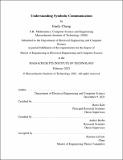| dc.contributor.advisor | Katz, Boris | |
| dc.contributor.advisor | Barbu, Andrei | |
| dc.contributor.author | Cheng, Emily | |
| dc.date.accessioned | 2022-06-15T13:04:08Z | |
| dc.date.available | 2022-06-15T13:04:08Z | |
| dc.date.issued | 2022-02 | |
| dc.date.submitted | 2022-02-22T18:32:26.089Z | |
| dc.identifier.uri | https://hdl.handle.net/1721.1/143215 | |
| dc.description.abstract | We quantitatively study the emergence of symbolic communication in humans with a communication game that attempts to recapitulate an essential step in the development of human language: the emergence of shared abstract symbols in order to accomplish complex tasks. In our experimental setup, a teacher must communicate an abstract notion, a formula in first order logic rendered to them in natural language, to a student. Subjects do so through a narrow channel that deprives them of common shared symbols: they cannot see or speak to one another and must only communicate via the motions of cars in a computer game. We observe that subjects spontaneously develop a shared vocabulary of car motions for task-specific concepts, such as “square” and “forall”, as well as for task-agnostic concepts such as “your turn”. We find that symbols are harder to establish than icons and indices, and that systematically, indices develop before icons, which develop before symbols. We characterize the conditions under which indices, icons, and symbols arise, and identify communicating in ambiguous game environments as the primary pressure for icon and symbol development. | |
| dc.publisher | Massachusetts Institute of Technology | |
| dc.rights | In Copyright - Educational Use Permitted | |
| dc.rights | Copyright MIT | |
| dc.rights.uri | http://rightsstatements.org/page/InC-EDU/1.0/ | |
| dc.title | Understanding Symbolic Communication | |
| dc.type | Thesis | |
| dc.description.degree | M.Eng. | |
| dc.contributor.department | Massachusetts Institute of Technology. Department of Electrical Engineering and Computer Science | |
| mit.thesis.degree | Master | |
| thesis.degree.name | Master of Engineering in Electrical Engineering and Computer Science | |
